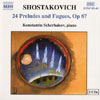Shostakovich Preludes and Fugues
Scherbakov is virtuosic and idiomatic, but doesn’t reach the depths of the music in the way the composer or Richter did
View record and artist detailsRecord and Artist Details
Composer or Director: Dmitri Shostakovich
Label: Naxos
Magazine Review Date: 4/2001
Media Format: CD or Download
Media Runtime: 142
Mastering:
DDD
Catalogue Number: 8 554745/6

Tracks:
| Composition | Artist Credit |
|---|---|
| (24) Preludes and Fugues |
Dmitri Shostakovich, Composer
Dmitri Shostakovich, Composer Konstantin Scherbakov, Piano |
Author: David Fanning
For the collector looking for a single version of Shostakovich’s Preludes and Fugues there is no easy choice just at the moment. The composer’s own indispensable recordings of 18 of the 24 are fast disappearing (on the legally challenged Revelation label, 7/97 and 2/98); Richter, in many ways the finest exponent of all, only recorded six of them; the two available sets by Tatyana Nikolaieva, the most doughty champion of the complete cycle, each comes on three discs – I continue to favour the excessively drily recorded 1987 Melodiya over the excessively resonant 1990 Hyperion; Jarrett and Mustonen are respectively far too bland and far too wilful to be recommendable. That leaves the recent Ashkenazy – solid, consistent and richly recorded, though tonally rather edgy and lacking the stature for the more philosophical fugues – and Konstantin Scherbakov’s new recording, which shares many of Ashkenazy’s strengths and weaknesses.
Technically Scherbakov is superbly fluent – certainly more so than Nikolaieva – and sympathetic to most of Shostakovich’s characteristic moods. But direct comparison with the composer himself or with Richter makes his limitations apparent. His tone-quality has a tendency to blandness in piano and to shallowness and thinness in forte, not helped by the dryish acoustic. This means that such tours de force as the D flat Prelude and Fugue emerge rather monochrome (and with some very strange textual readings in this particular case), while the interpretations score higher for concentration than inwardness. The very first Prelude and Fugue, for instance, is calm and reverent but more than a shade soporific, and Scherbakov responds somewhat formally to the melancholic introspection of the slower movements and to the lofty Bachian emulations of such pieces as the F major Prelude (No 23). His premature acceleration in the final fugue and subsequent belabouring of the obvious are sure signs that he has failed to grasp its philosophical dimensions.
At a fraction of the price of competing versions, this recording deserves serious consideration. But it is not a contender for a tip-top recommendation.'
Technically Scherbakov is superbly fluent – certainly more so than Nikolaieva – and sympathetic to most of Shostakovich’s characteristic moods. But direct comparison with the composer himself or with Richter makes his limitations apparent. His tone-quality has a tendency to blandness in piano and to shallowness and thinness in forte, not helped by the dryish acoustic. This means that such tours de force as the D flat Prelude and Fugue emerge rather monochrome (and with some very strange textual readings in this particular case), while the interpretations score higher for concentration than inwardness. The very first Prelude and Fugue, for instance, is calm and reverent but more than a shade soporific, and Scherbakov responds somewhat formally to the melancholic introspection of the slower movements and to the lofty Bachian emulations of such pieces as the F major Prelude (No 23). His premature acceleration in the final fugue and subsequent belabouring of the obvious are sure signs that he has failed to grasp its philosophical dimensions.
At a fraction of the price of competing versions, this recording deserves serious consideration. But it is not a contender for a tip-top recommendation.'
Discover the world's largest classical music catalogue with Presto Music.

Gramophone Digital Club
- Digital Edition
- Digital Archive
- Reviews Database
- Full website access
From £8.75 / month
Subscribe
Gramophone Full Club
- Print Edition
- Digital Edition
- Digital Archive
- Reviews Database
- Full website access
From £11.00 / month
Subscribe
If you are a library, university or other organisation that would be interested in an institutional subscription to Gramophone please click here for further information.




